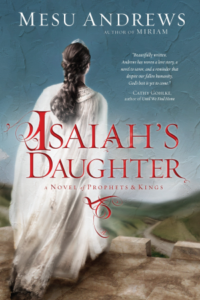Biblical fiction author Mesu Andrews explores the life of Isaiah and his captivating daughter in her new novel, Isaiah’s Daughter: A Novel of Prophets and Kings (WaterBrook). In this epic biblical narrative, Ishma (renamed Zibah), a young girl adopted by the prophet Isaiah, grows up to capture the heart of their nation’s future king. In this exclusive Q&A, Mesu tells why she loves writing biblical fiction, what inspired her to write Zibah’s story, and the research behind her biblical novels…

You are known for writing wonderful biblical fiction. What drew you to this genre, and what keeps it interesting for you?
You are so kind. Thank you. I grew up as a spiritual mutt—Mom, charismatic; Dad, Quaker; grandparents, Wesleyan—and I rebelled against everything that had to do with God or the Bible in my teen years. At age 19, I finally saw the reality of Jesus Christ in a high school friend’s changed life and knew I needed to read and understand the Bible for myself. I’m still on that journey. Reading and writing biblical novels gives me an “excuse” to research the Scriptures that intrigue me. Before I was published, I still researched the original languages, archaeology, and commentaries. The only difference now is that I get to share all that cool stuff with others.
Would you give us a brief synopsis of this story?
Ishma comes to the prophet Isaiah’s home as a 5-year-old orphan, devastated after watching her family destroyed and living as a captive. With tenderness and care, her lively spirit is revived, and the prophet and his wife adopt Ishma, giving her a new name—Zibah, delight of the Lord. As the years pass, Zibah wins Prince Hezekiah’s favor, a boy determined to rebuild the kingdom his father has nearly destroyed. But loving this man awakens Zibah’s painful past and calls into question the very foundation of her father’s prophecies. Can she learn to rely on only Yahweh, who gives life, calms fear, and conquers nations?
What inspired you to write Zibah’s story? Why was this novel begging to be written?
“Hephzibah,” Zibah’s full name, has been my favorite name in Scripture since I first learned its meaning: the Lord’s delight is in her. I want to be Hephzibah every day of my life. I was also intrigued by Hephzibah because she was married to the most righteous king in Judah (Hezekiah) and yet was mother to the most wicked king in Judah (Manasseh). I discovered this conundrum about the time my daughters were entering their adult years and breaking free of my control. My girls weren’t wicked like Manasseh, but as adults they’ve made choices their dad and I haven’t always agreed with. I wanted to know more about Hephzibah who watched her son destroy her husband’s legacy while remaining a delight to her God. Early in my research, I also discovered the Jewish tradition that Zibah may have been Isaiah’s daughter, adding still more intrigue to this complex and fascinating web of royal relationships. A series of questions began to haunt me, but most important of all: What lessons can we learn today from the clues this family left us?
 What was the research process like? Do you enjoy doing the research for your books?
What was the research process like? Do you enjoy doing the research for your books?
I began researching Hephzibah (Zibah) and her life six years before I signed a publishing contract to write the book. Judah/Israel was a patriarchal society, meaning history was passed down through men and from men’s perspectives, so studying Zibah meant studying the men’s lives around her. I studied Isaiah’s lineage, Assyria’s siege on Jerusalem, and Hezekiah’s mortal illness. Then I asked, “How would these facts and details affect Isaiah’s daughter, Hezekiah’s wife?” During the research process, I find additional characters recorded in Jewish traditions and add those to the biblical story, trying to maintain historical accuracy with biblical authenticity. Do I enjoy research? Absolutely LOVE it. I’m a Bible geek and proud of it!
What will readers find relatable to their own lives in the story of Isaiah’s Daughter?
Readers often find different things than I expect, which is part of the joy I find in writing. But I’ll share a couple of things I learned while writing. Zibah seeks security and peace throughout the book, hoping to find it in a place, a thing, a person, a role. Ultimately, she reaches the conclusion that many of us spend our whole lives seeking: Our only peace comes by focusing on eternal things rather than this temporary life we lead. Hezekiah struggles to understand God and His Word. I think anyone who has asked God, “Why?” or struggled with a particular passage of Scripture will relate to Hezekiah’s journey.
Visit Mesu Andrews’ author page here:
https://www.familyfiction.com/authors/mesu-andrews/
Isaiah’s Daughter: A Novel of Prophets and Kings
Mesu Andrews
WaterBrook


